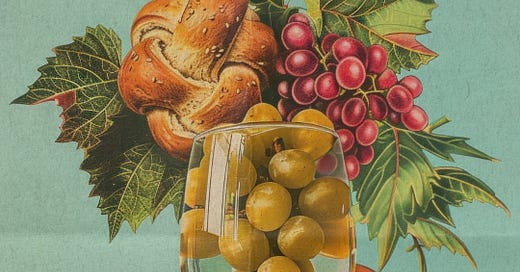The liturgical calendar marks the Body of God, Corpus Christi. In Catholic tradition, the miracle of transubstantiation is celebrated today, bread and wine become the sacred body and blood, remembering the Last Supper.
But mine is the living calendar of feathered cloaks, of the Pleiades, of swarms, and of the udder-like ground.
They call it a miracle, but they forget the true prodigy that preceded their theology. Neglecting that wheat only grows because the soil rotted the dead, the sun gilded it, and the wind danced it. They forget that wine only exists because fungi devour the sugar in grapes. They abhor that no body is pure. They call sacred a ritual that hides the brutality of separation, man from the earth, god from the world, sacrifice from abundance. Because beyond doctrine, or perhaps before it, older echoes resound.
You can hear the song of the first harvests, of wheat growing in the gut of the soil, now ripe, fermented, and transformed into bread; of grapes brewing mingled with fungi, turned into wine; of the invisible dance of thousands of lives and fruits in an intimate pact between cycles, sun, water, earth, and human hands.
How many bodies make up the body of a god? Our bodies. A collective body that shares the table of ecology, vibrating in cycles of giving and regeneration.
Today, I remember the perpetual dance of life that offers itself to continue—the harvest as an act of gratitude, not of possession, domestication, or accumulation. Bodies are sacred territories of interdependence and impermanence. Wine and bread as symbols of an abundance shared among humans, fungi, bees, rivers, and time.
Celebrating the Body of God means acknowledging that there is no sacred body without the anonymous gift of thousands of invisible bodies. For bread does not come from divine hands, but from the sacred alliance between the cosmos and the fertile ground, filled with microorganisms and all kinds of bonds. Wine does not pour down from heaven, but arises from the intimacy between grapes, fungi, and decomposition.
The scandal of interweaving reminds us that life is fertilized in decay. I kneel before the fertile chaos, where the bodies of gods and goddesses are humus and their blood is grapes fermented in fungal songs. The living bodies of gods, the Earth itself, offering themselves as food in cyclical abundance. Which gives and devours. We celebrate the daily miracle of ancestral transubstantiation, of the seed that becomes bread; of the fruit that turns into wine; of sustenance to the body; of body to place. This is the altar, this is the table, because the true miracle has always been ecological, of a living cosmos and fertile ground.
I’m working to make all posts open to everyone. Paid subscriptions help support the depth of this research, allowing these narratives to continue gestating outside institutional and market demands. You’re invited to support if you feel called, but your presence here, as a living witness, is already part of the story. You can also check out my online bookstore.
Honor hystera. Re-member. Response-ability. (Un)learn together.




